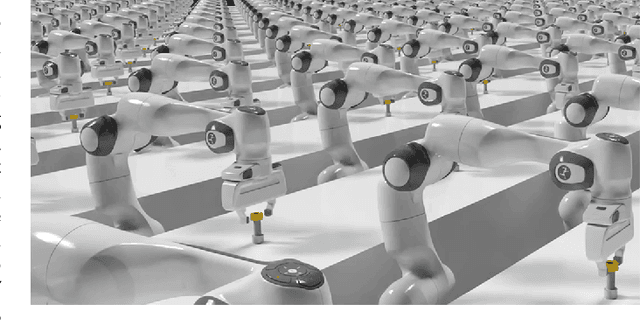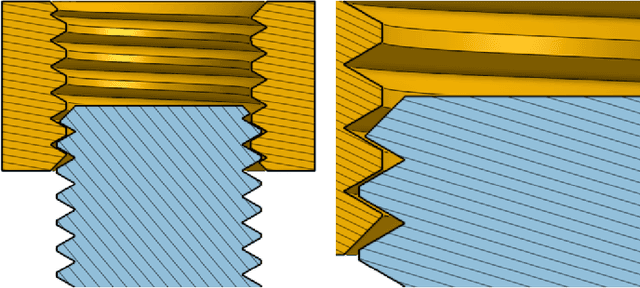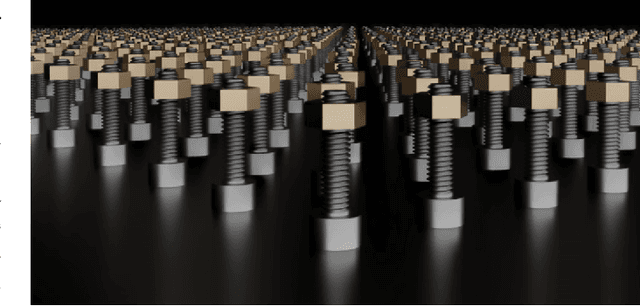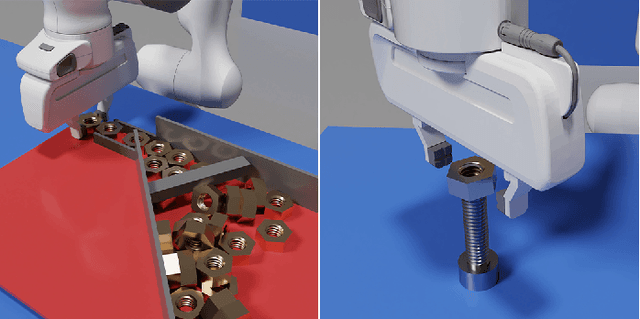Philipp Reist
Isaac Lab: A GPU-Accelerated Simulation Framework for Multi-Modal Robot Learning
Nov 06, 2025



Abstract:We present Isaac Lab, the natural successor to Isaac Gym, which extends the paradigm of GPU-native robotics simulation into the era of large-scale multi-modal learning. Isaac Lab combines high-fidelity GPU parallel physics, photorealistic rendering, and a modular, composable architecture for designing environments and training robot policies. Beyond physics and rendering, the framework integrates actuator models, multi-frequency sensor simulation, data collection pipelines, and domain randomization tools, unifying best practices for reinforcement and imitation learning at scale within a single extensible platform. We highlight its application to a diverse set of challenges, including whole-body control, cross-embodiment mobility, contact-rich and dexterous manipulation, and the integration of human demonstrations for skill acquisition. Finally, we discuss upcoming integration with the differentiable, GPU-accelerated Newton physics engine, which promises new opportunities for scalable, data-efficient, and gradient-based approaches to robot learning. We believe Isaac Lab's combination of advanced simulation capabilities, rich sensing, and data-center scale execution will help unlock the next generation of breakthroughs in robotics research.
Factory: Fast Contact for Robotic Assembly
May 07, 2022



Abstract:Robotic assembly is one of the oldest and most challenging applications of robotics. In other areas of robotics, such as perception and grasping, simulation has rapidly accelerated research progress, particularly when combined with modern deep learning. However, accurately, efficiently, and robustly simulating the range of contact-rich interactions in assembly remains a longstanding challenge. In this work, we present Factory, a set of physics simulation methods and robot learning tools for such applications. We achieve real-time or faster simulation of a wide range of contact-rich scenes, including simultaneous simulation of 1000 nut-and-bolt interactions. We provide $60$ carefully-designed part models, 3 robotic assembly environments, and 7 robot controllers for training and testing virtual robots. Finally, we train and evaluate proof-of-concept reinforcement learning policies for nut-and-bolt assembly. We aim for Factory to open the doors to using simulation for robotic assembly, as well as many other contact-rich applications in robotics. Please see https://sites.google.com/nvidia.com/factory for supplementary content, including videos.
Learning to Walk in Minutes Using Massively Parallel Deep Reinforcement Learning
Sep 24, 2021



Abstract:In this work, we present and study a training set-up that achieves fast policy generation for real-world robotic tasks by using massive parallelism on a single workstation GPU. We analyze and discuss the impact of different training algorithm components in the massively parallel regime on the final policy performance and training times. In addition, we present a novel game-inspired curriculum that is well suited for training with thousands of simulated robots in parallel. We evaluate the approach by training the quadrupedal robot ANYmal to walk on challenging terrain. The parallel approach allows training policies for flat terrain in under four minutes, and in twenty minutes for uneven terrain. This represents a speedup of multiple orders of magnitude compared to previous work. Finally, we transfer the policies to the real robot to validate the approach. We open-source our training code to help accelerate further research in the field of learned legged locomotion.
 Add to Chrome
Add to Chrome Add to Firefox
Add to Firefox Add to Edge
Add to Edge